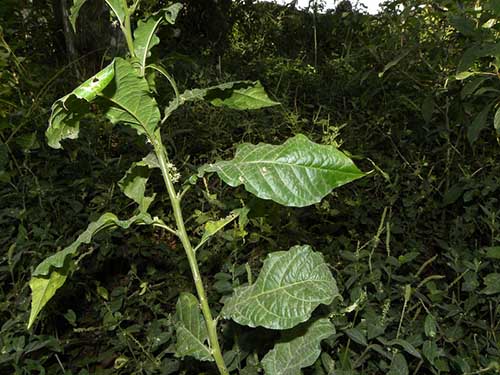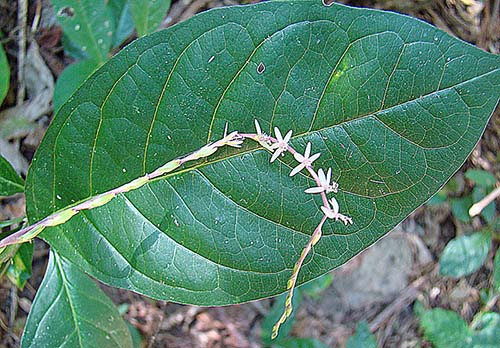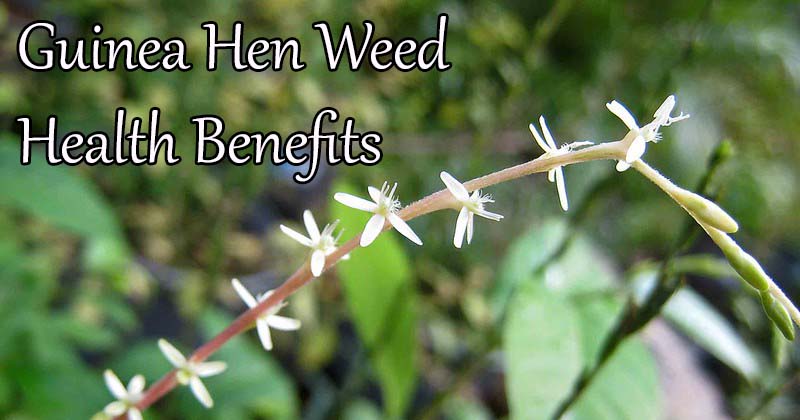While living in Peru, I badly sprained my ankle while hiking in the jungle. A local friend gave me mucura – also known as guinea hen weed or anamu – to help with the inflammation and pain. While I can’t say with 100% certainty that the plant helped with the pain and swelling, the science backs it up.
While guinea hen weed still isn’t very well known in western cultures, it is starting to get a lot of attention for its anti-inflammatory and anti-cancer benefits. Here’s what you need to know about the medicinal plant and how to use it.
What Is Guinea Hen Weed?

Guinea hen weed is an herb native to the Amazonian rainforest, though it now can be found throughout Central and South America and even parts of the Southern USA. It grows up to 3 feet tall, has deep roots, small whitish-green flowers, and emits a garlic-like smell.
The leaves and roots of the plant have long been part of natural medicine in the region. It is mostly used for treating colds, flus, pain, infections, and as an insect repellent. More recently, the plant has gotten attention as a treatment for cancer.
Recommended: Guinea Hen Weed Tea (Roots and Leaf)
Other Names for Guinea Hen Weed:
Because guinea hen weed is used by so many cultures throughout the Americas, it has many different names. Here are just some of the most common ones.
- Petiveria alliacea (Latin)
- Amasu
- Anamu
- Apacina
- Mucura
- Tipi
- Garlic weed
- Gully root
- Apazote de zorro
- Kojo root
Compounds in Guinea Hen Weed/Anamu
Researchers have isolated many compounds from guinea hen weed. These include many types of:
- Flavonoids (astilbin, myricitrin, engeletin, pinitol)
- Triterpenes
- Fatty acids
- Allantoin
- Coumarin
- Sulfur-containing amino acids (in the roots)
Individually, these compounds are known to have numerous health benefits. However, the beauty of natural medicines is that the compounds work together. Whereas traditional drugs tend to work in just one way (such as killing bacteria), the compounds in guinea hen weed can tackle ailments on multiple fronts (such as killing bacteria while boosting immunity and reducing inflammation). You can read more about Amazonian medicinal plants here.
Proven Benefits of Guinea Hen Weed/Anamu

Even though guinea hen weed has been used medicinally for centuries, the plant didn’t get much scientific attention until the early 2000s. That’s when researchers started seriously investigating its cancer-fighting abilities. Now, there are thousands of studies showing numerous benefits of guinea hen weed. Here are just the main ones.
1. Fighting Infections
Like many other Amazonian plants, guinea hen weed has evolved to contain chemicals which help it fight infection. These same chemicals can help humans fight infections. In particular, the 18+ sulfur compounds in guinea hen weed have been shown to be very effective in killing bacteria and fungus – including candida and E. coli. There is also evidence that it helps fight against viral infections too.
In general, the roots of guinea hen weed are considered better than the leaves for fighting infection. However, the leaves also contain anti-microbial compounds as well as compounds which can boost immunity. (1, 2, 3, 4, 5)
2. Anti-Cancer
While the mechanism is quite complex, compounds from guinea hen weed have repeatedly been shown to kill tumor cells, slow tumor cell growth, and help regulate healthy cell activity. This has been tested against various types of cancers – including breast, colon, and lung cancer. (6, 7, 8, 9, 10)
3. Inflammation
Numerous animal and cell studies have found that extracts from anamu plant reduce inflammation. This is likely because of the many antioxidants in the plant and compounds like pinitol, myricitrin, and coumarin – all of which are known to reduce inflammation markers.
Because of these properties, anamu could help treat inflammatory conditions including:
- Arthritis
- Rheumatism
- IBS and IBD
- Psoriasis
- Asthma
Traditionally, anamu root and leaves are ground into a paste and applied externally to treat inflammation pain. However, for systematic inflammation, it can also be taken internally to fight inflammation from the inside out. (11, 12, 13, 14, 15)
4. Skincare
In traditional medicine, anamu is often applied topically to treat rashes and skin infections. Because it is a natural antimicrobial and anti-inflammatory, anamu can also have many other benefits for skin health, such as reducing redness from acne or treating inflammatory skin conditions like psoriasis. The plant also contains allantoin, which is well known for helping to reduce scars and speed up wound healing. Allantoin also helps shed dead skin cells so the skin also becomes smoother. (16, 17)
5. Mental Health and Neuromodulation
There is some research that shows guinea hen weed can have mental health benefits including treating depression and anxiety. Some studies also show that it can help improve long-term memory. These benefits are mostly linked to the flavonoids, terpenoids and coumarins in anamu, which can help reduce oxidative stress and regulate neurological activity. (18, 19, 20)
How to Use Guinea Hen Weed/Anamu
Both the root and leaves of guinea hen weed can be used medicinally. You can take them internally as a dried powder, tincture, or infused into a tea. There is no standard dosage but usually around 1-4 grams of dried herb per day is recommended. It’s also possible to apply guinea hen weed externally. This is usually done as a poultice or extract mixed into a cream.
Tea/Infusion:
Pour 1 cup of boiling water over 1 tsp of anamu powder and let it steep for 10 minutes. Strain and drink. Note that anamu tea (especially the root) is pretty bad tasting, which is why you only really want to use a small amount of water to make the infusion as there will be less for you to drink. It tastes better when consumed cold, so add some ice cubes or let it sit in the fridge before drinking. For medicinal benefits, drink twice per day.
Capsules:
Take 450mg to 3 grams of powdered anamu twice per day.
Tincture:
Take 1-3ml of tincture twice per day.
Poultice:
If you have access to fresh amanu plant, you can beat it into a paste. Put it between pieces of gauze and apply to the problematic area (such as joints or the temples for treating headache).
Warnings
Pregnant women and women who are trying to get pregnant should not take amanu. It can cause uterine contractions and possibly result in miscarriage. Because the plant contains coumarin, a natural blood thinner, it might not be safe for people who are taking Warfarin or have blood disorders. Always talk to your doctor before taking any medicinal herbs.
Recommended Anamu/Guinea Hen Weed Products
SipaCupa Anamu Tea
This tea is made from the roots and leaves of amanu weed. It tastes and smells like the amanu I had in Peru and the brand is generally reputable. There is 1.5 grams of amanu powder per teabag and 24 teabags per box. Get it here.
Eden Gardens Amanu and Ball Moss Tea
Here is another good brand of amanu tea. Unlike most other amanu products, this one contains just the roots of the plant (which are known to be more potent, especially for pain and inflammation). It also contains Jamaican ball moss, which is known for its anti-inflammatory benefits and helping reduce bloating. There are 20 teabags per box with 1.8 grams of powder in each. Get it here.
PureLife Herbs Anamu Powder
If you take amanu often, then this is much more economical than buying teabags. The package contains 16oz (or 454 grams), which is the equivalent of nearly 13 tea boxes. The only issue with this amanu powder is that it is made from just the leaves of the plant and not the roots. However, that does mean it tastes better. You can get it here.
TerraVita Anamu 450mg Capsules
TerraVita is a good budget brand which makes several Amazonian supplements. Their amanu capsules are made from powdered leaves (not the roots) and contain 450mg each. The suggested dosage is 1 capsule, 3x per day. You can get it here.
Rainforest Pharmacy Anamu Capsules
The brand Rainforest Pharmacy makes a lot of supplements based on natural medicinal plants from Peru and Brazil as well as some other tropical areas. The supplement is made from the leaves (not the roots) and has 500mg per capsule. You can get it here.
Do you tried amanu for health? Let us know about your experience in the comments section below.






